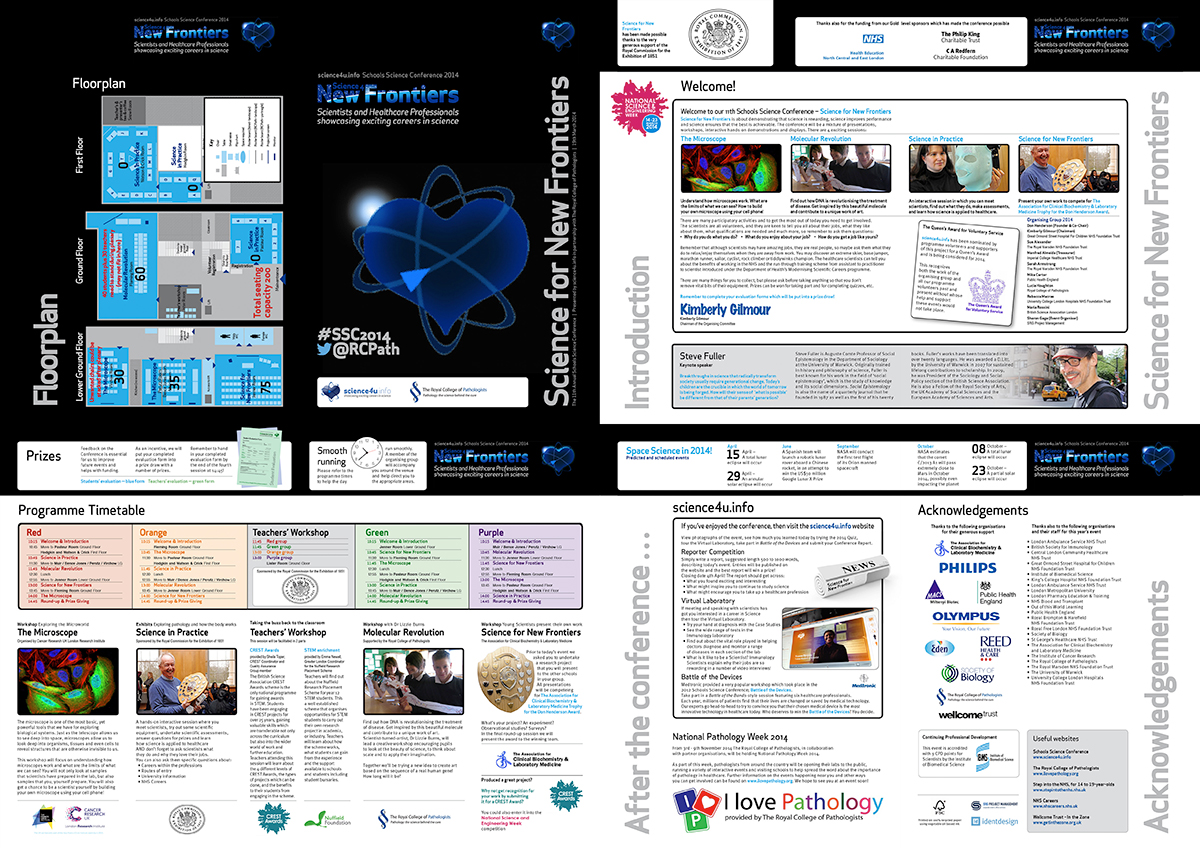The 11th Schools Science Conference comprised the following exciting sessions:
- Welcome & Introduction
- Science for Experimentation – Young scientists present their own work
- Science for Interaction
- Science in Practice
- The Microscope – Interactive Workshop
- Molecular Revolution – Interactive Workshop
- Science for Educators – CPD Teachers’ Workshop
- Science for Inspiration
- Keynote speech
- Round-up & Prize Giving
Science in Practice
Interactive Exhibits – Sponsored by the Royal Commission for the Exhibition of 1851
Meet the Scientists and Healthcare Professionals
Hands-on interactive sessions where you meet scientists, try out some scientific equipment, undertake scientific assessments, answer questions for prizes and learn how science is applied to healthcare.
You can also ask them specific questions about:
- Careers within the professions
- Routes of entry
- University information
- NHS Careers
AND don’t forget to ask scientists what they do and why they love their jobs.
The Microscope – exploring the micro world
Interactive Workshop
Presented by Cancer Research UK London Research Institute
The microscope is one of the most basic, yet powerful tools that we have for exploring biological systems. Just as the telescope allows us to see deep into space, microscopes allow us to look deep into organisms, tissues and even cells to reveal structures that are otherwise invisible to us.
This workshop will focus on understanding how microscopes work and what are the limits of what we can see? You will not only look at samples that scientists have prepared in the lab, but also samples that you, yourself prepare. You will also get a chance to be a scientist yourself by building your own microscope using your cell phone!
Molecular Revolution
Interactive Workshop
Presented by Dr Lizzie Burns, supported by The Royal College of Pathologists
Find out how DNA is revolutionising the treatment of disease. Get inspired by this beautiful molecule and contribute to a unique work of art. Scientist-turned-artist, Dr Lizzie Burns, will lead a creative workshop encouraging pupils to look at the beauty of science, to think about scale and to apply their imagination.
Together we’ll be trying a new idea to create art based on the sequence of a real human gene! How long will it be?
Don Henderson Award
Competition
Young Scientists present their own work
Prior to today’s event we asked you to undertake a research project that you will present to the other schools in your group.
All presentations will be competing for The Association for Clinical Biochemistry & Laboratory Medicine Trophy for the Don Henderson Award.
The award will be presented at the end of the day.
CPD Teachers’ Workshop –
Taking the buzz back to the classroom
CREST Awards and STEM Enrichment
Presented by Sheila Toper and Emma Newall
CREST Awards
Presented by Sheila Toper
CREST Coordinator and Quality Assurance Group member
The British Science Association CREST Awards scheme is the only national programme for gaining awards in STEM. Students have been engaging in CREST projects for over 25 years, gaining valuable skills which are transferable not only across the curriculum but also into the wider world of work and further education. Teachers attending this session will learn about the 4 different levels of CREST Awards, the types of projects which can be done, and the benefits to their students from engaging in the scheme.
STEM enrichment
Presented by Emma Newall
Greater London Coordinator for the Nuffield Research Placement Scheme
Teachers will find out about the Nuffield Research Placement Scheme for year 12 STEM students. This a well established scheme that organises opportunities for STEM students to carry out their own research project in academia, or industry.
Teachers will learn about how the scheme works, what students can gain from the experience and the support available to schools and students including student bursaries.
New Frontiers
Keynote Speaker
Steve Fuller
Breakthroughs in science that radically transform society usually require generational change.
Today’s children are the crucible in which the world of tomorrow is being forged.
How will their sense of ‘what is possible’ be different from that of their parents’ generation?
Steve Fuller is Auguste Comte Professor of Social Epistemology in the Department of Sociology at the University of Warwick.
Originally trained in history and philosophy of science, Fuller is best known for his work in the field of ‘social epistemology’, which is the study of knowledge and its social dimensions. Social Epistemology is also the name of a quarterly journal that he founded in 1987 as well as the first of his twenty books. Fuller’s works have been translated into over twenty languages. He was awarded a D.Litt. by the University of Warwick in 2007 for sustained lifelong contributions to scholarship.
In 2009, he was President of the Sociology and Social Policy section of the British Science Association.
He is also a Fellow of the Royal Society of Arts, the UK Academy of Social Sciences and the European Academy of Sciences and Arts.
Steve Fuller
Auguste Comte Professor of Social Epistemology, Department of Sociology, University of Warwick





